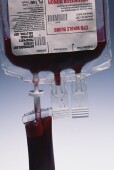Blood Substitute Found Safe in Large Phase III Trial
It worked best in those under 80, could ease expected worldwide shortfall of supplies.
|
E-mail this article
Subscribe to news
Printer friendly version
|

(SOURCE: UCLA Health Sciences, news release, June 10, 2008)
FRIDAY, June 20 (HealthDay News) -- A blood substitute product called HBOC-201 proved safe and effective in a six-week Phase III multi-center clinical trial, a new study reports.
In all, 688 patients, ages 18 and older, who had elective orthopedic surgery initially received either one unit of blood (about one pint) or an equivalent one unit (65 grams) of HBOC-201, which is a hemoglobin-based oxygen carrier. Patients could receive up to 10 units of the blood substitute or unlimited blood transfusions over six days. The patients were evaluated daily and six weeks after their surgery.
Most of the 350 patients receiving the blood substitute used an average of five or less units, while the 338 patients receiving blood used less than two units on average.
"We found that we eliminated the need for blood transfusions for 59 percent of the 350 patients who received the blood substitute. The blood substitute worked best in those under 80 years old with a moderate transfusion need," study author Dr. Colin F. Mackenzie, professor and former director of the National Center for Trauma and EMS, University of Maryland School of Medicine, said in a prepared statement.
The blood substitute did not work as well as blood in patients over age 80 with more acute health issues and higher transfusion needs, and many of these patients were switched to regular blood.
Twenty-one of the older patients who received the blood substitute suffered a number of cardiac and central nervous system problems. Analysis revealed that these were due to advanced age, heart failure or possibly under-treatment, according to the researchers.
Death rates in patients with moderate transfusion needs who received either blood or the blood substitute were 1 percent. Death rates among patients with high transfusion needs were 5 percent in the blood substitute group and 3 percent in the blood group.
Common temporary side effects noted in patients who received the blood substitute included skin discoloration interpreted as jaundice, elevated blood pressure, and increased levels of the enzymes troponin and lipase.
The study, published in the June issue of the Journal of Trauma: Injury, Infection, and Critical Care, was funded by the Biopure Corporation, which makes HBOC-201.
The need to develop an alternative to red blood cells is being driven by a predicted shortfall of more than four million units of blood worldwide, according to background information in the study.
More information
America's Blood Centers has more about blood transfusions. 
Copyright © 2008 ScoutNews, LLC. All rights reserved. 
HealthDayNews articles are derived from various sources and do not reflect federal policy. healthfinder.gov does not endorse opinions, products, or services that may appear in news stories. For more information on health topics in the news, visit the healthfinder.gov health library.